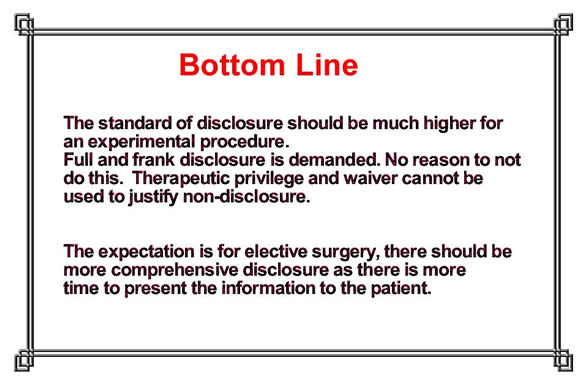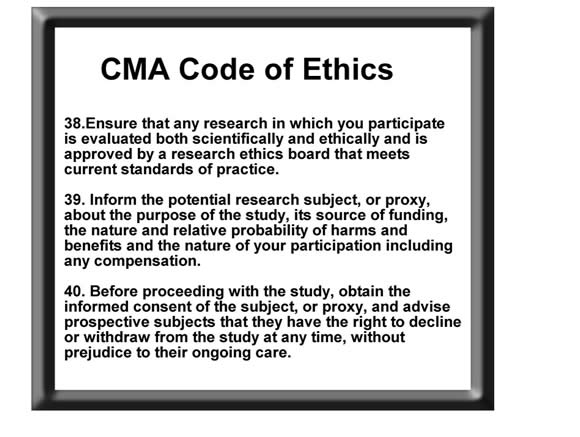Informed Consent
Experimental Therapy
Coughlin v. Kuntz (1987 BC Supreme Court)
The standard of disclosure should be much higher for any experimental procedure.
Full and frank disclosure is required.
The orthopedic surgeon (defendant) had developed his own procedure for spinal disc surgery. No other doctor had ever used it – he had developed an acrylic disc spacer. The College of Physicians and Surgeons had asked him to stop using this procedure until it could be fully investigated. The surgeon however, used it on the patient with bad result.
In court there was discussion regarding the consent:
There was significant information which the defendant did not communicate to the patient. He did not tell the patient that:
- Procedure was invented by surgeon and was unique to him.
- Procedure was not in general use
- Surgeon had been investigated by the college who requested that he not perform the procedure pending further investigation
- There were potential risks associated with the acrylic disc spacer
- That the defendant rejected standard medical investigations and subscribed to medical opinions unique to him
- Another doctor had given a contrary opinion with respect to surgery
- Problems with the cervical spine of this nature could be treated conservatively without surgery
The finding was that a reasonable person in the plaintiffs position would have rejected the surgery had they known the risks and other information.
The existence of a signed consent form was no protection for the defendant from liability unless the patient had been informed satisfactorily.
Held that:
- The defendant was negligent with regard to improper diagnosis, use of an experimental surgical procedure that was unsupported by a clinical study and for failing to obtain adequate informed consent.
Causation was found – no reasonable person in the patients position would have proceeded with the surgery had they known the facts.
Elective surgery provides more time to present information to the patient, for information seeking, for consultation with other doctors, family members – more time to obtain consent.
Attending physician has ultimate responsibility.
Halushka v University of Saskatchewan:
This case set the standard for experimental research/therapy. A student was paid $50 to participate as a research subject in a test of a new anesthetic. He was told that the test was safe and that there was nothing to worry about. The experiment did however involve a new drug that had not been tried on humans before. He was also not told that a catheter would be inserted into his heart. He signed a consent form which purported to release the doctors from any liability. During the test, he suffered from a cardiac arrest, but fortunately he was resuscitated.
The court found that the experimenter was in a fiduciary position and that full and frank disclosure should have been given. The violation of this was held to be a battery (this case was prior to Reibl v Hughes).



